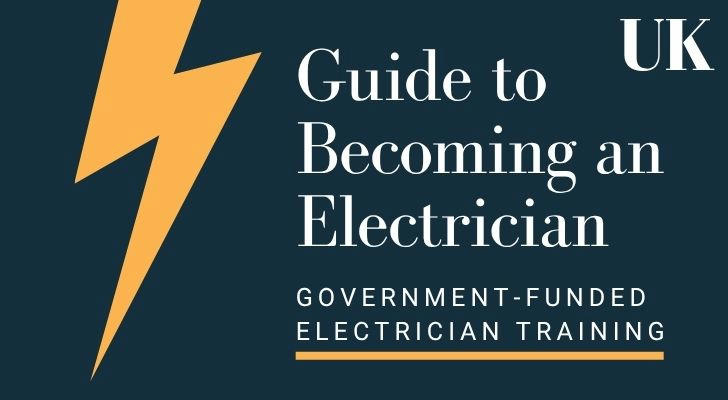Becoming an Electrician in the UK – Guide to Training and Funding
The UK’s shift to greener energy and modern infrastructure is increasing the demand for qualified electricians. Government-backed training routes offer accessible ways to enter the trade or retrain.

Why Train as an Electrician?
Electricians are essential to the modern economy. From installing wiring in new homes to maintaining smart systems and solar technologies, their work supports both daily life and the UK’s long-term environmental goals. The role offers strong earning potential, job stability, and clear paths for career advancement. Many electricians also move into self-employment or supervisory positions over time.
Training Pathways
There are several routes into the electrical trade, suited to different ages and career stages:
◾ Skills Bootcamps – Short, intensive government-backed courses (up to 16 weeks) focused on core electrical skills. Ideal for adults retraining or upskilling quickly.
◾ Apprenticeships – A structured, longer-term pathway (typically 3–4 years) combining practical work experience with classroom study.
◽ Level 2 & 3 Diplomas – Formal qualifications in electrical installation or electrotechnical systems, often included within bootcamps or apprenticeships.
◽ AM2 Assessment – A final practical exam required for full qualification as an installation or maintenance electrician.
These programmes often lead to recognised qualifications such as City & Guilds Level 2/3 Certificates, NVQ Level 3 Diplomas, or the AM2, all valued by UK employers.
Government Support and Funding
Government funding plays a key role in making electrician training more accessible across the UK. Several public initiatives help lower the financial barriers associated with training, particularly for adults looking to retrain, upskill, or return to the workforce.
✔ Skills Bootcamps, supported by the Department for Education and regional authorities, are short, intensive programmes designed to meet industry demand. For eligible adults—such as those unemployed, self-employed, or seeking a career change—public funding typically contributes to part of the course cost.
✔ Apprenticeships combine paid work with formal training and are co-funded by employers and the government. This allows learners to gain practical experience while working toward recognised qualifications.
✔ The Adult Education Budget and National Skills Fund offer financial support for individuals without a Level 3 qualification, or those earning below a certain income threshold. This funding helps ensure training remains accessible to a broad range of learners.
✔ Jobcentre Plus and local employment programmes may also provide assistance with course placement, travel costs, or equipment needs—particularly for older adults or those re-entering the workforce.
By reducing training costs, these government-backed schemes help individuals focus on gaining skills rather than managing tuition fees. Funding availability may vary by region and provider, so it's recommended to check eligibility in advance.
Notable Training Providers
Several organisations deliver government-backed electrician training in partnership with public agencies and employers.
🟢 Trade Skills 4U – National Leader in Electrical Training
Trade Skills 4U offers 16-week Skills Bootcamps combining practical and theoretical training. Partnering with the Department for Education and local authorities, they provide accessible programmes across the UK with strong employer links to support job placement and career progression.
Other Recognised Providers
JTL Training – Provides apprenticeships across England and Wales, blending on-the-job experience with classroom learning, aligned with industry needs.
Access Training UK – Offers flexible, fast-track courses designed for adult learners seeking quick entry or retraining.
City & Guilds Approved Centres – Local colleges delivering accredited electrical qualifications, often supported by regional funding.
It’s important to check that providers and courses are government-recognised and eligible for funding.

Recognised Certification
Upon completion, learners may earn qualifications such as:
🔹 City & Guilds Level 2 or 3 Certificates
🔹 NVQ Level 3 in Electrotechnical Systems
🔹 AM2 Practical Assessment
🔹 CSCS Card (for site work)
These credentials are required for most professional roles and ensure compliance with UK safety and wiring standards.
Who Can Apply?
Most programmes are open to UK residents aged 19 and above, with no formal qualifications required to begin. Many courses are designed to support:
◾ Young adults (19–30) seeking apprenticeships.
◾ Mid-career adults (31–50) looking to retrain.
◾ Older adults (50+) starting a second career.
There are no upper age limits, and many courses include flexible options to accommodate work or family responsibilities.
Application Process:
1️⃣ Search for courses on official sites like gov.uk or the National Careers Service.
2️⃣ Choose a suitable programme and apply online via the training provider.
3️⃣ Attend any required info sessions or skills assessments.
4️⃣ Confirm funding eligibility and the certificate awarded after completion.
Conclusion
Training as an electrician is a practical and future-focused career choice. With multiple government-supported routes available—including Skills Bootcamps and apprenticeships—it’s now more affordable and accessible than ever. Whether you're just starting out or looking for a fresh start, the path to becoming a qualified electrician is open to people from all walks of life.

